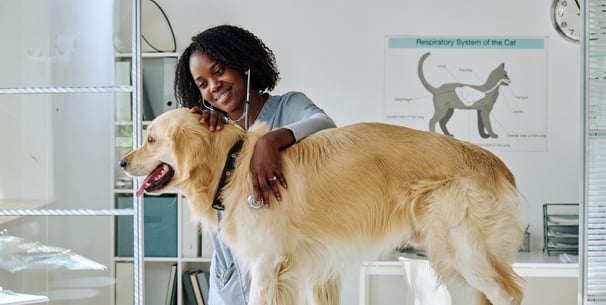Understanding Fishy Breath in Dogs: Causes and Solutions
Index:



Introduction
Recognising this peculiar odour is crucial for your pet's well-being. In this comprehensive guide, we'll delve into the causes of fishy breath in dogs and explore effective solutions to ensure your furry friend stays healthy and happy.
Causes of fishy breath in dogs
Dental issues are at the forefront of causing fishy breath in dogs. Plaque buildup, tartar buildup, tooth decay and gingivitis not only affect your dog's oral health but also contribute to bad dog breath.
These problems can lead to more severe conditions like periodontal disease if left untreated, as highlighted in our guide on pet dental care, emphasising the importance of addressing dental concerns promptly.
Beyond dental health, digestive problems and gastrointestinal imbalances play a significant role in causing unpleasant breath.
A poor diet or issues with nutrient absorption can lead to odours that are far from the typical dog breath smell.
Moreover, systemic health issues like kidney disease, diabetes and liver problems can manifest through fishy breath, indicating a need for a comprehensive health check.
Another surprising contributor is clogged anal glands, which, when expressed, can leave a fishy scent on your dog's breath if they lick themselves.
This issue, while not directly related to the mouth, underscores the complexity of diagnosing the cause of fishy breath.



Recognising the symptoms
Fishy breath in dogs is often accompanied by other signs and symptoms that pet owners should be aware of. These can include excessive drooling, a reluctance to eat, signs of discomfort while chewing, or even pawing at the mouth if dental issues are present.
Recognising these symptoms early can prevent more serious health issues down the line.
Real-life scenarios might include a dog suddenly showing disinterest in their favourite chew toys or experiencing noticeable weight loss due to eating difficulties.
These examples underscore the importance of observing your pet's behaviour and physical health closely.
Prevention
Preventing fishy breath starts with maintaining good dental hygiene. Regular brushing with an appropriate dog toothbrush and toothpaste is key to removing plaque and preventing tartar build-up.
Furthermore, a balanced diet plays a critical role in not just oral health but overall well-being. Integrating a grain-free diet might benefit some dogs, especially if they have specific dietary sensitivities that affect their breath.



Seeking veterinary help
Consulting a veterinarian is essential for a proper diagnosis and treatment plan. Veterinarians can pinpoint the underlying health conditions causing the odour and recommend specific treatments or dietary adjustments.
It's crucial to seek professional help if you notice persistent bad breath despite regular dental care or if other symptoms accompany the fishy smell. This approach ensures that any serious health issues are addressed promptly.
Conclusion
Fishy breath in dogs can be a sign of various health issues, from dental problems to systemic diseases. Understanding the causes and recognising the symptoms are the first steps in addressing this concern.
Prevention through regular dental care and a balanced diet is key, but when in doubt, seeking veterinary advice is always the best course of action. By taking proactive steps towards managing your dog's health, you contribute to a longer, happier life for your furry companion.
For more helpful information on canine health please visit our other content such as can dog gets hiccups? Why is my dog licking his lips? and Can you give dogs paracetamol?
FAQs
What does it mean when your dog's breath smells like fish?
When your dog's breath smells like fish, it could indicate dental disease, gum disease or oral infections contributing to the foul odour. It might also signal digestive issues, kidney disease, diabetes or anal sac disease. Another cause could be impacted anal glands, which are a common but often overlooked source of foul breath.
How do you get rid of the fishy smell on dogs?
To combat the fishy smell on dogs, prioritise oral care through regular dental cleaning and the use of enzymatic toothpaste. Providing a diet possibly including fish oils for fresher breath and consulting a veterinarian for professional cleaning and diagnosis are key steps. Treatment options may vary based on the diagnosed medical conditions.
What does liver failure smell like in dogs?
Liver failure in dogs can produce a distinct, strong odour emanating from the mouth, often described as foul or fishy, indicative of a serious bacterial infection or underlying conditions affecting the liver's ability to function.
Can stomach issues cause bad breath in dogs?
Absolutely, stomach issues in dogs, including digestive imbalances and food particles fermenting in the gastrointestinal tract, can lead to bad dog breath. These conditions may be symptomatic of a more significant health concern requiring veterinary attention.
How can impacted anal glands cause fishy breath in dogs?
Impacted anal glands can lead to a foul smell, with the scent becoming evident on your dog's breath if they lick the area to soothe discomfort.
Are there home remedies for fishy dog breath?
Home remedies for managing fishy dog breath include ensuring regular dental care, offering a balanced diet that avoids fish-based food to prevent foul breath, and employing canine toothpaste for daily brushing. These steps help reduce dental plaque and control mouth bacteria.
Why might a female dog's breath smell like fish?
A female dog's breath smelling like fish can stem from the same issues as male dogs, such as dental infections, tooth infections and gum infections, alongside digestive problems and anal sac disease. Hormonal changes might also contribute to foul smells, making oral care and diet crucial.
How can I prevent my dog's breath from smelling like fish after eating?
Preventing your dog's breath from smelling like fish after meals involves dental care practices, including the use of enzymatic toothpaste , and managing their diet to minimise food particles that could lead to foul breath.
What are the top reasons why a dog's breath smells like fish?
The leading causes of a dog's breath smelling like fish are dental disease, oral infections, anal sac disease and gum disease, along with digestive issues that include food particles contributing to bad breath. Medical conditions such as kidney disease and diabetes can also be factors.
When should I consult a veterinarian for my dog's fishy breath?
You should consult a veterinarian for your dog's fishy breath if it persists, especially if accompanied by other concerning symptoms that could indicate dental or other medical conditions. Besides tooth loss, signs to watch for include excessive drooling and difficulty eating. Symptoms like increased thirst and urination could signal diabetes or kidney disease, while changes in urination patterns might suggest a urinary tract infection.
Other symptoms warranting a vet visit include lethargy, unexplained weight loss, vomiting, or diarrhoea, as these could be signs of digestive issues or other serious underlying health issues. If your dog exhibits signs of discomfort around their mouth or rear end, it could be related to gum disease or anal gland issues, such as anal sac infections, all of which require professional assessment and treatment options.
A comprehensive evaluation by a veterinarian can help identify whether the fishy breath is due to dental disease, gum disease or more systemic medical conditions.
Waggel Pet Insurance
Need more help? You're in luck if you're a Waggel Pet Insurance member. Along with our excellent coverage, we offer access to a 24/7 online vet to answer all your sticky questions, especially if you need grooming assistance.
Not a member? Why not get a quote now and cover your furry friend for a range of illnesses, all while enjoying our amazing perks and rewards.
Want more like this?
Get updates from us with helpful info, advice, answers to frequently asked questions and much more.
Index:
Related posts:
Get your quote
Along with our excellent coverage, we offer access to a 24/7 online vet to answer all your sticky questions.





